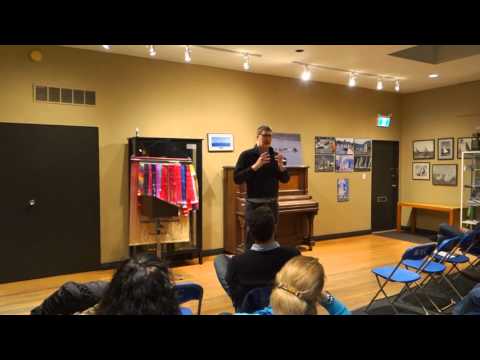Title: The Future of Filmmaking – 360 degree videos and virtual reality
Please subscribe :) youtube.com/geoffmobile
In the last month, both Youtube and Facebook enabled 360 degree videos on their sites. The first affordable 360 degree cameras are coming out in the next few weeks. And virtual reality headsets are becoming more commonplace. What does this mean for filmmakers who want to take advantage of this new medium and technology?
What do the following have in common:
-Being at the Hong kong student protests (Umbrella revolution)
-Flying in a fighter jet at an airshow
-Standing on a beach and having the singer Bjork dance around you
-Being on stage at a performance of the musical the Lion King
-Being on stage at a late night talk show.
What they have in common is that they are all experiences I had when using my virtual reality headset, the Zeiss VR One. (Show the headset and put it on).
Mobile VR is great because you use the screen and sensors inside your smart phone, in combination with a headset such as this one, to experience virtual reality. The phone senses when you move your head so that it can adjust the image accordingly, providing an immersive experience.
Implications for filmmakers:
1. Framing vs 360 degree Choice:
Can no longer direct exactly where the viewer will be looking.
For news, it means that people will be able to form their own opinions about the footage rather than being shown specific cuts of specific things.
2. Fast cutting between different angles vs Being There:
Films become more experiential and realistic. While TV is all about fast cuts from different angles, the nature of VR is that it prefers longer cuts from fewer viewpoints, and it’s up to the viewer to look around the room. This will make for more challenges for actors and crews, and VFX teams, because no-one can hide outside the camera angle. For example, you can always look off stage or behind you.
3. Moving camera vs Stationary observer.
Motion can cause dizzyness.
The biggest problem with virtual reality is that movement (acceleration) can easily cause motion sickness. The mind gets confused when the eyes and inner ear are receiving conflicting signals. Riding a camel made me dizzy after a few seconds.
Conclusion: VR 360 degree filmmaking has the potential to give people more immersive experiences. But this new medium will need to change some fundamental assumptions of filmmaking. Namely, you can no longer be sure where viewers are looking, that we can no longer do fast cuts between angles, and that moving the camera can easily cause dizzyness.
Filmed at Vancouver Toastmasters Club 59 tmclub59.com






